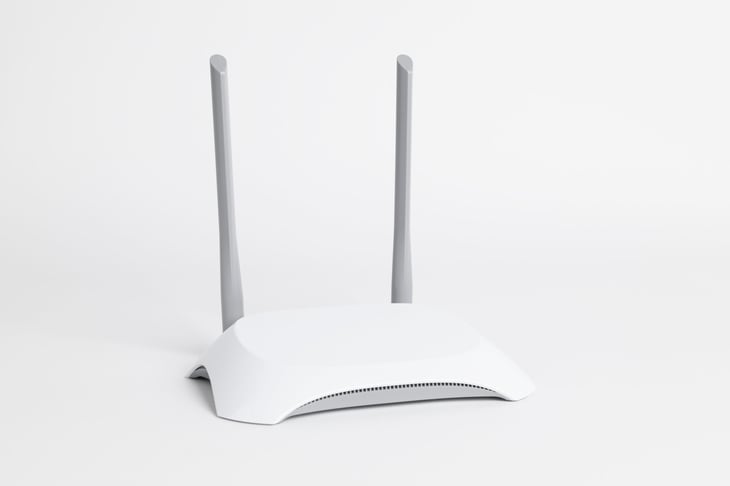
Editor's Note: This story comes from CableTV.com.
When it comes to home internet service, cell phone networks have typically been a last resort. But with 5G home internet, you’ll get download speeds that’ll cover a whole family’s internet needs.
5G home internet isn’t a one–size–fits–all solution, but 5G internet’s low prices and decent download speeds can make it a potential internet option if you’re already a Verizon, T-Mobile, or AT&T subscriber.
Let’s break down the biggest things you need to know if you’re considering moving your home internet to 5G.
What is 5G home internet?

If you’ve bought a smartphone within the past few years, it’ll use one of two cell phone data systems: 4G or 5G.
4G is older technology, but with download speeds of around 20 Mbps, it’s been good enough for people who simply need mobile internet.
But 5G, which began rolling out in 2019, offers maximum download speeds of up to 1 Gbps (in ideal conditions).
Carriers like T-Mobile and Verizon have launched 5G home internet plans that bring 5G internet service into your home.
How is 5G home internet installed?

To set up 5G home internet, you’ll install a gateway device near a window or high point in your home.
This receiver will create a connection between your home and the carrier’s 5G mobile data network, giving your devices internet access.
Since 5G is wireless, you won’t need to worry about running cable through your walls.
But if your home has reception dead zones, you might need to fiddle with your gateway in order to get the best 5G signal.
Best 5G home internet plans

Here’s a breakdown of plans by price, max download speeds, max upload speeds, and data caps.
- Verizon 5G Home Internet: $35.00–$80.00/mo., 85–1,000 Mbps, 10–50 Mbps, unlimited
- T-Mobile 5G Home Internet: $60.00/mo., 72-245 Mbps, 15-31 Mbps, unlimited
- AT&T Internet Air: $55.00/mo., 40–140Mbps, 5–25Mbps, unlimited
5G home internet pros and cons

From features to cost, 5G is a different ballpark compared to traditional cable internet service providers (ISPs).
If you’re deciding between 5G and cable internet, here’s what you need to know beforehand.
Cost

On paper, most home 5G plans cost as much as standard cable internet plans. T-Mobile and Verizon’s starter plans are in line with cable ISPs like Spectrum and Xfinity.
But if you bundle cell phone and home 5G service, you can potentially save a lot on your monthly bill.
For instance, T-Mobile and Verizon knock $25 to $35 off your monthly home 5G bill if you also have a smartphone plan.
If that’s not enough of a hard sell, both carriers also throw in benefits like no data caps, no equipment fees, and multi-year price guarantees.
Availability

5G coverage isn’t as rare as it was a few years ago, but 5G home internet availability is another story.
We had mixed results when we checked for 5G home internet in multiple states, and it was largely unavailable in rural areas.
Home 5G isn’t a niche product — T-Mobile and Verizon’s home 5G plans cover around 70 million homes total — but providers have rolled out coverage on a city–by–city basis.
And considering that some towers have a broadcast range of only 1,500 feet, your chances of getting service will depend on how close you live to a major city.
Reliability

Your home’s 5G connection depends on the 5G towers in your area, which bakes a level of unpredictability into the process.
For instance, Verizon’s two home 5G plans have listed speed ranges instead of the maximum download speed you’d traditionally expect from an internet plan.
5G Home has download speeds between 85 Mbps and 300 Mbps, while 5G Home Plus has speeds between 300 Mbps and 1,000 Mbps. Your real-world speed will generally fall between these two poles.
Home 5G speeds are generally decent — Verizon and T-Mobile customers online have mentioned average speeds of between 200 Mbps and 400 Mbps — but you might experience performance dips if your local 5G tower is handling a lot of traffic.
If your local home 5G carrier offers a trial period or no-contract service, we’d suggest taking advantage of this flexibility and giving 5G a spin to see if your home can get a reliable 5G connection.
Is 5G worth it?

5G home internet doesn’t have the consistency of cable internet nor the premium performance of fiber internet plans.
But as a budding internet service, 5G internet does offer truly wireless home internet alongside excellent pricing if you bundle it with a cell phone plan.
We’d recommend home 5G internet if your household has average internet needs and if a lower bill is more important to you than the fastest download speeds.
Let’s move on to some 5G home internet FAQ.
Does 5G work for home internet?

5G can be used for home internet, but your internet performance depends on the quality of 5G coverage in your area.
What are the disadvantages of 5G?

Some of 5G home internet’s disadvantages include varying download speeds, inconsistent availability, and performance swings if your area is experiencing high network traffic.
How fast is Verizon 5G Home Internet?

Verizon 5G Home Internet has two download speed tiers: 5G Home has maximum download speeds between 85 Mbps and 300 Mbps, while 5G Home Plus has speeds between 300 Mbps and 1,000 Mbps.
Your exact speed will depend on the 5G network in your area.
How fast is 5G home internet?

5G home internet has maximum potential speeds of around 1,000 Mbps, but customers online have reported download speeds of around 150 to 300 Mbps.
What is 5G home internet?

5G home internet uses cell phone carriers’ 5G network to provide internet service to your home.





Add a Comment
Our Policy: We welcome relevant and respectful comments in order to foster healthy and informative discussions. All other comments may be removed. Comments with links are automatically held for moderation.